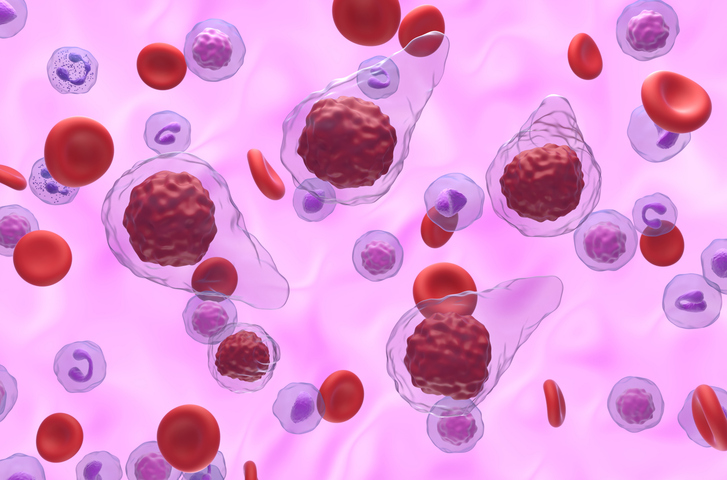
The MANIFEST-2 trial (NCT04603495) is a global, double-blind, phase III study evaluating the efficacy and safety of pelabresib combined with ruxolitinib versus placebo with ruxolitinib in Janus kinase inhibitor (JAKi)-naïve patients with myelofibrosis. Pelabresib, an investigational BET inhibitor, aims to reduce the expression of myelofibrosis target genes. A study presented at the Society of Hematologic Oncology 2024 Annual Meeting in Houston, Texas, involved 430 patients with intermediate-1 or higher-risk myelofibrosis, meeting specific criteria such as spleen volume, symptom severity, and performance status.
Patients were randomized to receive either pelabresib or placebo, along with ruxolitinib, over 21-day cycles. The primary endpoint was a ≥35% reduction in spleen volume (SVR35) at week 24. Secondary endpoints included changes in total symptom score (TSS) and a ≥50% reduction in TSS (TSS50), as well as hemoglobin response and safety.
At week 24, the pelabresib+ruxolitinib group showed a significantly higher SVR35 response rate (65.9%) compared to the placebo+ruxolitinib group (35.2%) (P<0.001). Although the mean reduction in TSS was greater in the pelabresib group, it was not statistically significant (P=0.055). The TSS50 response was similar between the two groups (52.3% vs. 46.3%, P=0.22). A hemoglobin response was observed in 10.7% of patients in the pelabresib group versus 6.0% in the placebo group, with sustained differences in hemoglobin levels up to week 48.
In terms of safety, common treatment-emergent adverse events included anemia (43.9% vs 54.7%), thrombocytopenia (52.8% vs 37.4%), and diarrhea (23.1% vs 18.7%) in the pelabresib+ruxolitinib and placebo+ruxolitinib groups, respectively.
The study concluded that pelabresib combined with ruxolitinib significantly reduces spleen size, improves anemia, and shows a trend toward better symptom management in JAKi-naïve myelofibrosis patients.
“Pelabresib+ruxolitinib significantly reduced splenomegaly, with numerically smaller TSS at week 24, and improved anemia at week 24 and week 48 compared with placebo+ruxolitinib in JAKi-naïve patients with myelofibrosis, addressing key hallmarks of myelofibrosis,” the study authors concluded. “Results support a potential paradigm shift to combination therapy for myelofibrosis.”
Reference
Mascarenhas J, Rampal RK, Grosicki S, et al. Safety and efficacy of pelabresib in combination with ruxolitinib for myelofibrosis: latest data from the phase III MANIFEST-2 study. Abstract #MPN-135. Presented at the Society of Hematologic Oncology 2024 Annual Meeting; September 4-7, 2024; Houston, Texas.






 © 2025 Mashup Media, LLC, a Formedics Property. All Rights Reserved.
© 2025 Mashup Media, LLC, a Formedics Property. All Rights Reserved.